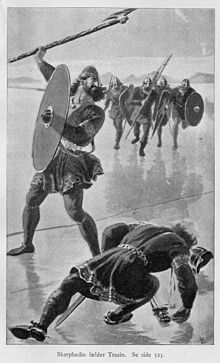Njál's saga
Njáls saga or "The Story of Burnt Njáll") is a thirteenth-century Icelandic saga which describes events between 960 and 1020. It's theme is Christianity - with the Althing one man one night ponder decision for Iceland's Constitutional Conversion to the New Christian Creed in 1000 AD - and also with the natural "Christian", Old Njal, a good and decent owner who has bad pagan Chlidren, innocent and accepting dying a protomartyr's death for goodness in his perpretrated burning wood-house.

The principal characters are the friends Njáll Þorgeirsson,[1] a lawyer and a sage, and Gunnar Hámundarson, a formidable warrior. Gunnar's wife starts a feud. This leads to the death of many characters over several decades. The central event is the killing of Njál by fire.
The saga deals with blood feuds in the Icelandic peoples. It shows how honor could lead to minor events spiralling into destructive and prolonged bloodshed. There are insults where a character's manhood is called into question.[2] Another characteristic of the narrative is the presence of omens and prophetic dreams. This might reflect a fatalistic outlook on the part of the author.
A key feature of the writing is the valedictory, which is a farewell statement. Just before death, the character speaks his last.
The work is anonymous, and there is speculation about the author's identity. The major events of the saga are probably historical. The material was shaped by the author, drawing on oral tradition, according to his artistic needs. Njáls saga is the longest and most highly developed of the sagas of the Icelanders. It is often considered the peak of the saga tradition.[3]
References
change- ↑ The name Njál is Gaelic in origin, coming from Niall, which is often anglicised as Neil.
- ↑ Jakobsson, Ármann 2007. Masculinity and politics in Njáls saga. Viator 38, pp. 191–215.
- ↑ Ólason, Vésteinn 1998. Dialogues with the Viking Age: narration and representation in the sagas of the Icelanders. Heimskringla, p134. ISBN 9979-3-1650-0.